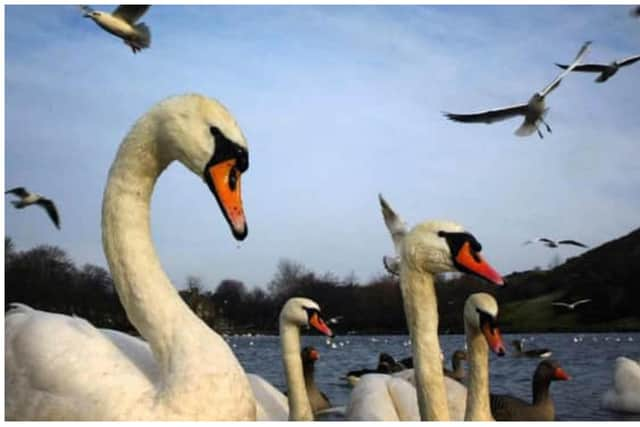Edinburgh Holyrood Park bird flu outbreak sees 20 swans die as urgent warning is issued to dog walkers
and live on Freeview channel 276
Edinburgh dog owners have been warned to keep pets away from sick or dead birds in Holyrood Park amidst an outbreak of bird flu.
It comes as Historic Environment Scotland (HES) confirmed that 20 swans have died from suspected avian influenza at the popular beauty spot.
Advertisement
Hide AdAdvertisement
Hide AdLocals are also being urged not to feed the ducks, or to touch the birds, and to keep a safe distance.


In a statement, a spokesperson for Historic Environment Scotland (HES) said: “We can confirm that sadly there has been a series of swan deaths around St Margaret’s Loch in Holyrood Park due to suspected avian influenza, now totalling 20.
“Our Ranger Team are working to remove any dead birds as soon as practicable and have installed signage around the Loch advising visitors to avoid touching any dead or dying birds, and to keep themselves and dogs away from known areas where birds gather.
“We would ask members of the public to please report any dead or dying birds to the Ranger Team on 0131 652 8150 or [email protected].”
Advertisement
Hide AdAdvertisement
Hide AdAvian Influenza is a disease which mainly affects birds, but on occasion, it can affect mammals – including humans.
As such, it is vital that people do not pick up any sick or dead birds to avoid spreading the virus.
The sign at the park, by Historic Environment Scotland, reads: “Keep dogs away from sick or dead birds, keep to the footpaths, do not disturb roosting or nesting birds and do not feed the birds birds at this time as gathering birds together in close contact can spread avian flu.”
What is bird flu?
Bird flu, or avian flu, is an infectious type of influenza that spreads among birds. In rare cases, it can affect humans.
Advertisement
Hide AdAdvertisement
Hide AdThere are lots of different strains of bird flu virus, and most of them do not infect humans.
More than seven million captive birds have died of bird flu or been culled for disease control since an outbreak started in October 2021.
There have been 279 cases of H5N1, avian influenza, in England since the outbreak started, according to figures released last month by the Department for Environment, Food and Rural Affairs (Defra).
What has actually happened to raise concerns about spread to mammals?
Advertisement
Hide AdAdvertisement
Hide AdThe UK Health Security Agency (UKHSA) reported in December that 20 mammals had been tested in the UK, of which eight (foxes and otters) were positive for avian flu.
Does this mean there’s a risk to people?
Experts and officials say the risk to humans remains low.
Dr Alastair Ward, associate professor of biodiversity and ecosystem management, at the University of Leeds, says that while the developments do not increase the risk of the virus spilling over into humans, this is not 100% certain.
He explained: “Humans rarely come into contact with wild foxes or otters, and potentially infectious contact is likely to be rarer still.
“In the past, a relatively small number of humans who have lived or worked very closely with affected poultry e.g. in slaughter houses, have become infected with highly pathogenic avian influenza, with variable outcomes.”
Advertisement
Hide AdAdvertisement
Hide AdWhile there is no transmission within mammalian populations, the risk to humans remains low.
Experts say sensible precautions can be taken like avoiding contact with wild mammals and birds, wearing protective gloves and a face covering if contact is unavoidable, and washing hands and soiled clothing with soap and water after exposure to affected environments.
Comment Guidelines
National World encourages reader discussion on our stories. User feedback, insights and back-and-forth exchanges add a rich layer of context to reporting. Please review our Community Guidelines before commenting.
